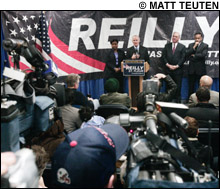 Talk about a bad Monday. On the morning of January 30, Tom Reilly — the Democratic attorney general and would-be governor of Massachusetts — was supposed to formally announce that Chris Gabrieli, the wealthy Democratic activist from Boston, was joining his campaign as a candidate for lieutenant governor. Over a span of 72 hours, however, the deal with Gabrieli had gone from probable to definite to nonexistent. Embarrassing enough, in its own right. But coming on the heels of a controversy over whether Reilly improperly intervened in a car-accident investigation in Worcester County (see “99 and 44/100 percent pure,” January 20), the Gabrieli gaffe seemed to be further proof that Reilly’s biggest selling point — his electability —had been greatly oversold.
Talk about a bad Monday. On the morning of January 30, Tom Reilly — the Democratic attorney general and would-be governor of Massachusetts — was supposed to formally announce that Chris Gabrieli, the wealthy Democratic activist from Boston, was joining his campaign as a candidate for lieutenant governor. Over a span of 72 hours, however, the deal with Gabrieli had gone from probable to definite to nonexistent. Embarrassing enough, in its own right. But coming on the heels of a controversy over whether Reilly improperly intervened in a car-accident investigation in Worcester County (see “99 and 44/100 percent pure,” January 20), the Gabrieli gaffe seemed to be further proof that Reilly’s biggest selling point — his electability —had been greatly oversold.
A few hours later, the state of Reilly’s candidacy looked completely different. On Monday afternoon, word began circulating that Marie St. Fleur — a Haitian-American legislator from Boston, and arguably the state’s most promising young politician of color — had agreed to jump into the lieutenant governor’s race as Reilly’s preferred candidate. (Four other candidates had already begun campaigning.) I soon received an e-mail from an astute Democratic insider who’s supporting Deval Patrick, Reilly’s opponent, in the Democratic primary. “With St. Fleur,” the insider wrote, “Reilly just won.”
Smart in the short term
That may be overstating it. But the short-term advantages of Reilly’s alliance with St. Fleur are undeniable. Gabrieli would have pumped untold millions of his own money into the campaign, which would have been a boon if Reilly ends up facing deep-pocketed Republican front-runner Kerry Healey in the general election. (See “The Price of Loyalty,” April 2, 2005.) But while Gabrieli is smart and likable, his public charisma is somewhat limited. Also, like Reilly, he’s a middle-age white male. Most worrisome, he was the Democrats’ LG candidate in 2002, when Shannon O’Brien lost the governor’s race to Mitt Romney; as a result, voters could regard him as a political retread.
If partnering with Gabrieli would have been risky, standing pat after their deal fell apart would have been disastrous. Reilly is the current Democratic front-runner for concrete reasons, including his significant fundraising edge (nearly $3.7 million in the bank at the end of 2005, compared to just over $500,000 for Patrick), his strong name recognition, and his widespread support among establishment Democrats. But the perception that Reilly is the candidate to beat has a self-perpetuating power of its own — and anything that undermines it constitutes a serious threat. The botched deal with Gabrieli, coupled with the aforementioned Worcester County flap, raised questions about whether Reilly and his handlers have sufficient competence to win a tough general-election fight. Left unchecked, this skepticism could have hurt Reilly in this weekend’s Democratic caucuses, where delegates to the party’s June convention will be elected. And if uncertainty about Reilly’s competence continued festering, some of Reilly’s establishment supporters might have begun asking whether he was such a smart pick after all.